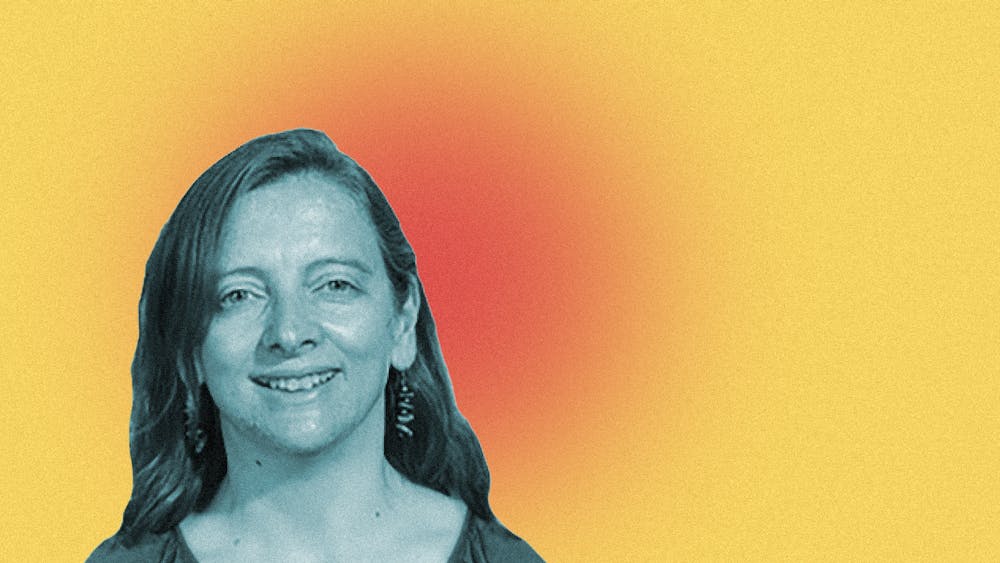If Evelyn Thomson weren't teaching physics at Penn right now, she might have ended up a veterinarian. “I grew up on a farm and could see that [being a vet] would be an interesting career,” says Thomson. As someone whose eyes light up at the mention of quarks, it's surprising to learn that physics wasn’t Thomson’s first calling. But growing up on a farm in Scotland, Thomson didn’t even know that becoming a groundbreaking particle physicist was a possible career choice.
In high school, Thomson chose to study physics to get into vet school. “I was really determined to get an A in physics, so I could go straight into veterinary medicine,” says Thomson. “I did get the A, but then I realized, ‘Hey, there are other things that I could do.’”
After attending an event aimed towards supporting women in science, Thomson began toying with the possibility of pursuing her interest in physics on a more serious level. “I'd never really considered physics as a career. Seeing people who were talking about their careers in physics actually opened my eyes that ‘Oh, I can do this as a career.’” So, Thomson began studying and performing research in physics at the University of Glasgow. In her fourth year, she took a class in particle physics. “I was hooked," she says, "because you could analyze your data and discover some particle that nobody knew existed before.”
Since then, Thomson has made revolutionary strides in the field of particle physics. She was part of a team that played a role in the Nobel prize—winning discovery of the Higgs boson, a new subatomic particle. Her recent work on particle symmetry to discover twin particles earned her recognition as one of the 2022 American Physical Society Fellows. “You see this big long list of people who are being elected fellows, and you're like, ‘Whoa, I'm on that list too,’” says Thomson with a smile.
Yet her proudest accolade is “not so much the research prizes, but the teaching prizes.” In fact, despite her international recognition, she names her greatest achievement as being selected by her students at Penn for the Ira H. Abrams Memorial Award for Distinguished Teaching. “When I started teaching here, I wasn't actually that good at it. The teaching style in Britain was [that] the professor came in and wrote on the board and pretty much went straight back out again. American students have higher expectations of interaction from their professors,” she notes. “So it took a little while to figure out how to be a good instructor and to try and get better at communicating that information.”
Balancing both teaching and research is no easy feat. “It's a juggling act,” Thomson says, “and most of the time I keep all the balls in the air. [But] sometimes it's not possible, so something crashes to the ground, and then I'm like, ‘Okay, I need to pick up the pieces for that.’”
As a woman in a predominantly male field, learning how to become the best educator possible requires personal work as well. “You're 30, you're blonde. You don't look like the professor down the hall who's 60, has gray hair, went to Stanford and has been doing this stuff forever. I had to kind of find my own path to that,” Thomson reflects.
Women are a consistently underrepresented group in physics, especially compared to other STEM fields. Currently, only nine of the over 40 faculty members in Penn’s Physics and Astronomy Department are women. And, as Thomson points out, “it's basically been the same number since I started here 18 years ago. So, we're running [with] about 20% women faculty in this department, and that's how it runs in terms of bachelor's degrees as well.”
Thomson is passionate about advocating for increased representation of women in physics. “It's important to me because the field isn’t catching all of the potential people out there who have creative ideas and are thinking differently. You're limiting your chances of making that next big discovery because there's been a lot of history of people all thinking the same way,” she says.
“Then, somebody comes in from a different background and has a different idea—and that can really revolutionize things.” Just like Dr. Evelyn Thomson herself.

